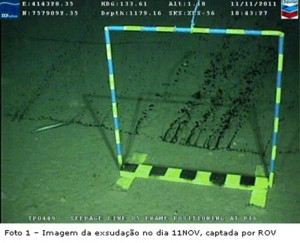
If the BP Deepwater Horizon disaster taught us anything, it’s that Big Oil has been doing very little over the last few decades to prevent oil spills despite their obscene record profits. Companies like Exxon, Chevron, and BP have all clearly decided that it’s more cost effective to use their profits to rig the system in their favor rather than prevent the next oil spill. By using their money to influence politicians and buy favorable public policies, Big Oil companies can limit their liability for the next disaster — which, if you don’t count impacts to the environment and human health, as Big Oil certainly does not, is way cheaper than actually taking adequate precautions.
Chevron’s recent oil spill off the coast of Brazil is another tragic example. Chevron reportedly pumped as much as $4 billion into its drilling operations in Brazil, yet had to be told by Petrobras, Brazil’s state-owned oil company, that its well was spewing oil into the Atlantic Ocean in the first place. Even more shocking, Chevron then had to borrow the sonar equipment to locate exactly where the leak was coming from.
Think about that for a second: Despite spending billions, Chevron didn’t even have the basic equipment to monitor its operations for spills and move quickly to stop oil from leaking into the ocean.
In her recent TED Talk, “Addicted to Risk,” Naomi Klein explains why BP’s oil spill in the Gulf last year and Chevron’s spill off the coast of Brazil are inevitable in the modern economic system, which “cannot survive without perpetual growth and an unending supply of new frontiers”:
http://video.ted.com/assets/player/swf/EmbedPlayer.swf
BP is as lax about safety precautions as Chevron. Greg Palast’s new book, Vultures’ Picnic, is one of the most maddening things I’ve ever read, as it seeks to get to the bottom of who was responsible for the Deepwater Horizon disaster and uncovers all sorts of malfeasance along the way. In 2006, BP’s pipeline in Alaska dumped over 6,300 barrels of oil in a totally preventable spill. As Palast writes:
The BP/Alyeska pipeline was dripping and ripping. In five years, it had dumped a quarter-million gallons of crude into the tundra. BP’s pipeline is an Exxon Valdez in slow motion. …
Based on the cancers I’d seen in Ecuador, I knew what would happen if this oozing continued. But this is America, not Ecuador, and we don’t let these things happen. So how come it is happening? …
Why is the pipe going to hell? I asked [Inspector Dan Lawn] for just the facts.
“They haven’t pigged it.” That is, they didn’t run the Pipeline Inspection Gauge, the PIG, the robot that runs inside the pipe. If they had, the Smart PIG (one with sensor-feelers) would have squealed at every crack and rusty chunk of the tube.
Sure enough, the records show that 400 miles of the Pipe hadn’t seen a PIG in eight years. Why? It costs up to a million dollars a mile to operate. Four hundred miles, $400 million. BP must have realized it’s cheaper to pay a fine.
All of the recent oil disasters we’ve witnessed are not isolated events. Nor are they mere “accidents.” In their quest for profits, oil companies are eagerly exploiting any new reserve that gets discovered, and the emphasis is always on production, not preservation or even basic caution. The problems at BP’s Deepwater Horizon rig and Chevron’s Frade well off the coast of Rio de Janeiro, in other words, are systemic.
Brazilian officials have, thankfully, been very aggressive in holding Chevron accountable. They’ve already levied at least $28 million in fines against the company, and as the investigation into the causes of the spill and Chevron’s response continues, it’s likely that those fines could reach close to $200 million. That’s pocket change for a company that makes $100 million every day, but Brazilian officials have also been openly discussing jail time for the responsible parties at Chevron, and have even discussed kicking Chevron out of the country altogether. This would be a huge blow to Chevron. There’s a reason the company has sunk billions of dollars into its Brazil operations — the oil fields off Brazil’s coast are one of the most significant discoveries in decades, and are expected to drive growth for the oil industry for years to come.
Chevron’s Brazil spill doesn’t only show the dangers of allowing such a reckless company to expand its offshore drilling operations to new countries, however — it shows the danger of expanding offshore drilling operations at all. Companies like Chevron are focused entirely on production and profits, and are completely unequipped to deal with the inevitable disasters that occur. Indeed, Big Oil seems to accept that dumping toxic oil into fragile ecosystems and paying the resulting fines are a mere cost of doing their dirty business.
That’s why companies like Chevron spend millions on lobbying. Right now, Chevron is spending $1 million a day drilling in the Gulf of Mexico. So it’s no surprise that this past quarter, the company spent over $2 million lobbying every federal agency who might have anything to say about its permits or its response to a spill: “In the July-to-September period, Chevron lobbied Congress, the Executive Office of the President, the Environmental Protection Agency, the Office of Management & Budget, the National Security Council, the U.S. Trade Representative, the Securities & Exchange Commission, the White House, departments of treasury, interior, commerce, energy and state, according to the October report.”
This is as perverse a situation as I can imagine. Like Naomi says, “Life is too precious to be risked for any profit.” Yet Big Oil is not only doing just that, they’re buying their way into making it legal.
Send an email to Brazil’s environmental officials calling on them to throw the book at Chevron. For once, don’t let Chevron get away with its environmental crimes.